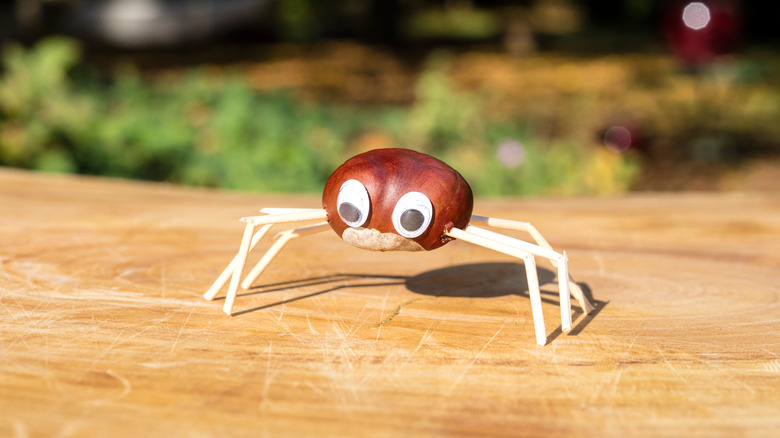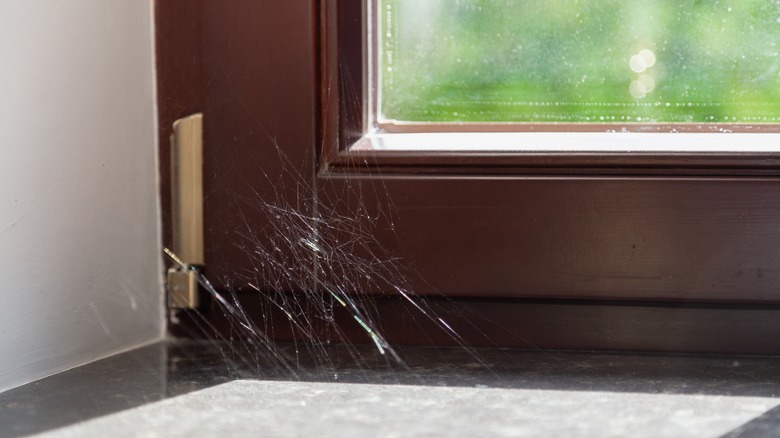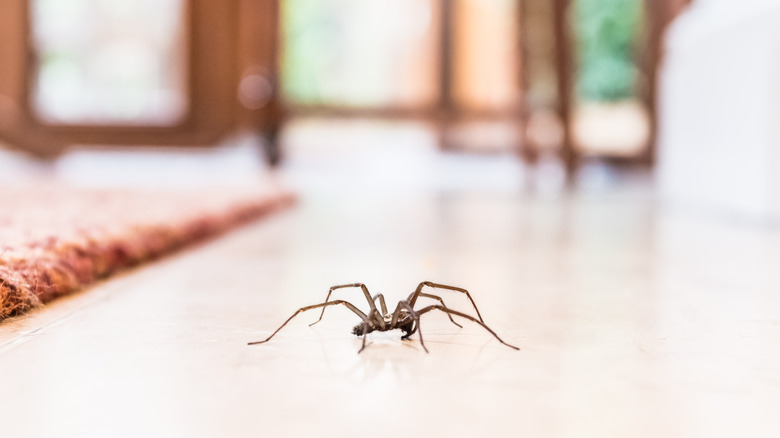What Are Conkers, And Do They Really Keep Spiders Out Of The House?
Conkers. Horse chestnuts. Buckeyes. The hard seeds of the Aesculus hippocastanum go by various names depending on which continent you reside. They're probably most well-known as a childhood plaything or a herald of fall, but some people also believe they repel spiders from the home. The advice goes that you line them up along your baseboards, windowsills, and near doorways to create a barrier no spider worth its web-spinning skills will cross. Is the tale true? At best, this folkloric spider deterrent is yet to be proven effective.
Conkers are the fruit of the Aesculus hippocastanum, commonly known as the horse chestnut tree. The tree, though native to the Balkans, can now be found in most of the world's temperate regions, including North America. While the tree is a popular ornamental (for example, the red horse chestnut is often recommended among small trees that grow in the shade), it's the fruit most people are familiar with. Peel off the soft spiky shell, and you'll find the hard seed often used in kid's crafts or the eponymous children's game, conkers. In America, the horse chestnut tree is sometimes mixed up with the Aesculus californica (California buckeye) or Aesculus glabra (Ohio buckeye). Though the fruit looks similar, it doesn't contain the same compounds. Apparently, only the fruit of the Aesculus hippocastanum will do for spider relief.
Exploring the myth
Unlike the chestnuts you roast in winter, horse chestnuts are far from edible. They contain aesculin, fraxin, and possibly a narcotic alkaloid — toxic compounds to humans and domesticated animals like dogs, cats, chickens, sheep, and cows. Some experts suggest the inedibility of horse chestnuts could be where the idea that they make for excellent spider repellant comes from. The Woodland Trust in the U.K. shares that the triterpenoid saponin wards away moths. Could people have simply conflated these winged creatures with their eight-legged brethren? In the U.S.A., Rod Crawford, author of Burke Museum's Spider Myths series, writes, "In the Pacific Northwest, where Osage oranges are seldom seen, the legend has been transferred to horse chestnuts." (Osage oranges are a popular — though debately effective — spider repellent in Midwestern states, where the plant is plentiful.)
In the past decade or so, regular yet curious folk have attempted to decipher the complicated conker-spider relationship. In 2018, Surrey Live reported that a U.K. resident filled his home with conkers in an effort to rid it of the spider he so despised. Instead of repelling the eight-legged beasties, the conkers became mini spider seats or frames for cobwebs. Wendy Graham, founder of the British eco-living blog Moral Fibres, had as little success with conkers as a spider repellent as the gentleman in Surrey. After placing horse chestnuts in her bathroom, where resident arachnids tended to congregate, she "found one spider merrily crawling over some conkers."
What do scientists say?
In 2010, the Royal Society of Chemistry (RSC) asked U.K. citizen scientists to debunk the "conker as a spider-repellent" myth. The £300 prize went to some school kids who, according to the RSC, created a legitimate experiment that effectively disproved the tall tale. Conversely, a study published in the Journal of Economic Entomology in 2018 found that at least two species of spider, Latrodectus geometricus and Araneus diadematus, "had a slight tendency to avoid chestnuts."
Lawrence Bee, a spider expert and member of the British Arachnological Society, is frank on the matter, telling Good Housekeeping, "There is no scientific evidence whatsoever that putting out conkers will deter spiders." Linda Erickson, a spider ecologist who goes by the moniker The Spider Chick, mimics the definitiveness of his response in a reply to the Quora question, "Do conkers keep spiders away?" "I've never seen anything in scientific literature suggesting that horse chestnuts ... deter any spiders," she writes.
Despite most experts proclaiming the untruth of the practice, the idea that conkers are among the fruits you need to banish spiders from the home is listed as "unproven" on Snopes. If you're still on the fence, a definitive answer may not be far away. In 2019, Professor Fritz Vollrath, a spider silk expert at the University of Oxford, told Daily Mail (among other outlets) he was planning a series of tests aimed at solving the debate. Though nothing seems to have come of the announcement to date, arachnophobes around the world await his results with bated breath!


